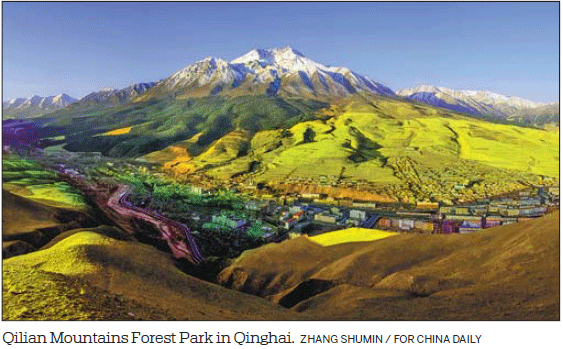The "roof of the world" shelters the global ecosystem. But many of the pillars that prop up the Qinghai-Tibet Plateau's ecology have come under assault from such forces as climate change and desertification. 
In response, the central and Qinghai provincial governments are adopting innovative solutions not only to protect places under threat, but also to restore degraded lands. Last year alone, Qinghai's grass coverage increased by more than 25 percent. And the province set a world record when it ran entirely on green energy for 360 consecutive hours in June, beating records it set in 2017 and 2018, according to Huanghe Hydropower Development, its major provider of new energy. During the same period, it even produced surplus power that it shared with central and eastern provinces. Currently, 86 percent of Qinghai's installed energy capacity comes from renewables. Meanwhile, the endangered Tibetan antelope population has increased to 70,000 from fewer than 20,000 in the 1980s, provincial environmental authorities said. Qinghai is the source of three great rivers - the Yangtze, the Yellow and the Lancang (or Mekong) - major waterways that supply China, and in the case of the Lancang, also parts of Southeast Asia. The village of Changjiangyuan takes its name from its location near the source of the Changjiang, or Yangtze, although it has moved from the remote grassland to just outside the city of Golmud. A top Chinese leader made a visit in August 2016, asking villagers about their life after the move and highlighting the importance of protecting the environment. Gega Namgyee, an elderly villager, said: "Grazing and garbage were harming the plateau. The relocation and reduced herding have helped to revive the grassland." More than 400 herders started the relocation process in 2004. The nomads had previously moved around in tents during warmer months. On average, they earned less than 2,000 yuan ($280) a year. Isolation made it difficult to send children to school. Now they live in new homes with running water and gas. In addition to subsidies, they earn money patrolling the mountains and rivers. "The patrols control poaching and other activities that harm the environment," Gega Namgyee said. At the same time, at Qarhan Salt Lake, for instance, the authorities are developing sustainable, eco-friendly ways to use resources and attract tourists at the same time. The 5,856-square-kilometer body of water is rich in potassium, magnesium and lithium. "All exploitation produces zero pollution," said Xie Kangmin, CEO of Qinghai Salt Lake Industry. For instance, all magnesium chloride produced while processing potash is captured and used to make other products. The lake is also developing tourism, which has become a major green industry in many places in Qinghai. On July 1, Xinzhuang, a village in Gaomiao township, opened a garden where visitors can enjoy flowers and cultural activities. Local authorities plan to cultivate more scenery and, in particular, restore mountainside vegetation, according to village Party secretary Li Changlong. So far, every resident has received 1,000 yuan per mu (1/15th of a hectare) from entry fees to the garden since it opened. Each ticket costs 20 yuan. More than 200,000 travelers visited food and entertainment venues in the village last year, generating 5 million yuan and supporting 4,000 jobs, Li said. Qinghai is keeping a close eye on its ecology. Since 2016, it has built 1,579 monitoring stations as part of a comprehensive network. Cameras installed at the source of the three rivers, known as Sanjiangyuan, also monitor wildlife and human activity, including illegal fishing, hunting and camping. Video surveillance and motorcycle patrols, which are undertaken 22 days a month, enable authorities to punish violators, said monitoring center staff member Losang Tashi. "The fact that we're observing more animals, such as Tibetan antelope, demonstrates ecological improvement," he said. The center also shares data in real time with government agencies and NGOs, said Li Fei, director of the information center under the provincial environmental protection authority, which runs the monitoring network. Initiatives to protect the environment, restore degraded areas and improve human development mean that Qinghai's future not only looks brighter but also greener.
|






7740f3b5-9ecb-438e-9052-76cb2d4bb671.jpg)

